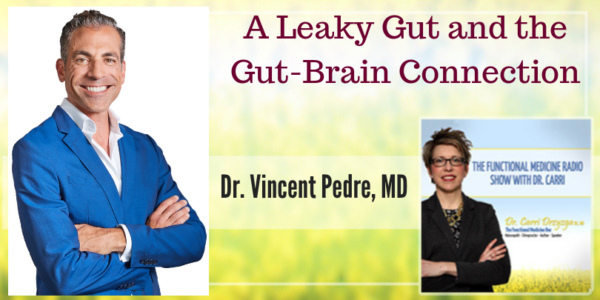Podcast: Play in new window | Download
Subscribe: Apple Podcasts | Android | RSS
In this episode of The Functional Medicine Radio Show, Dr. Carri’s special guest Dr. Vincent Pedre explains leaky gut and the gut-brain connection.
Dr. Vincent Pedre is the Medical Director of Pedre Integrative Health and Founder of Dr. Pedre Wellness, and a Functional Medicine-Certified Practitioner in private practice in New York City since 2004. He is a Clinical Instructor in Medicine at the Mount Sinai School of Medicine, also certified in yoga and Medical Acupuncture. He believes the gut is the gateway towards excellent health. For this reason, he wrote the book, Happy Gut—The Cleansing Program To Help You Lose Weight, Gain Energy and Eliminate Pain—which helps people resolve their digestive and gut-related health issues.
Main Questions Asked about Leaky Gut:
- Can you talk about what a leaky gut is, how can we test for it and why is it bad?
- Can you talk about how so many different diseases have their foundations in inflammation and immune system imbalance and that having underlying gut issues can impact the body in multiple different ways?
- When patients come in to see you, do you actually test for leaky gut or do you often times assume they probably have a leaky gut?
- Can you tell us about the mind-gut connection?
- What are your favorite exercises to stimulate the vagus nerve?
Key Points made by Dr. Pedre for Leaky Gut:
- The gut is this amazing organ system that is divided into different zones and starting with of course the mouth. Everybody forgets that the mouth is part of their gut and it’s so important to chew and break down your food mechanically so that you can absorb the nutrients more easily.
- When we talk about leaky gut, we’re mostly talking about what’s happening in the small bowel, but also it can happen in the colon. It becomes quite significant in the colon because of the type of bacteria that exists there.
- Leaky gut has been a term that has been used in naturopathic medicine and alternative medicine for a long time. But, in Western medicine, really thought that this was not real and that it was made up and it didn’t exist until the science and research finally caught up.
- A lot of studies have been looking at the effects of endotoxin on our health and what they find is that as endotoxin levels rise, then the risk for metabolic syndrome, which is basically an intolerance to glucose or resistance to the hormone insulin that tells the body where to put the glucose into the cells so it can be used for energy. Sugar levels start to rise. Insulin levels start to rise. That leads to obesity, especially central obesity or visceral obesity, puts on more fat in the middle. It becomes this vicious cycle so basically there’s this whole interconnection between leaky gut, inflammation, insulin resistance and obesity.
- That goes back to genetic individuality, predispositions. Sometimes you get a lot of crossover and it could also have to do with the type of imbalance that has been created. For example, if you get yeast overgrowth as a result of having been on either several rounds of antibiotics or you can even create your own yeast overgrowth by eating a diet really high in sugar and refined carbohydrates over a period of time. You’re feeding that part of the microbiome and you can generate your own yeast imbalance.
- What I found over time is that not every patient that has some sort of systemic manifestation of a gut issue is coming in complaining of gut problems.
- I think the patient story and what their experience is is so important because sometimes it’s discordant with the test results. Then you have to decide, well, who do I trust more? The test or the patient? I feel like it’s a balance, and that’s where medicine is an art and it requires a bit of creativity and instinct.
- I also have really gotten into doing organic acids testing because I find that that helps fill in a piece of that puzzle that sometimes can be missed in the stool test.
- You really have to have a wholistic approach to a patient with gut issues and really listen to them and acknowledge their story because I think that part of it. How did they get to that point where they’re in front of you in your office telling you this story? Go back in time and look at how did all of this start? What was happening in their life at the time? Was there travel? Was there foreign travel? You have to think parasites and all sorts of things.
- We can start with the vagus nerve that runs from the brain all the way down and innervates starting from the bottom third of the esophagus, pretty much all the internal organs and the gut, all the way almost to the very end. The vagus controls a lot of the signaling in the gut. You really need a good vagal tone to have healthy gut digestion.
- What’s really fascinating about this is what they’ve seen in patients with traumatic brain injury. The patient with traumatic brain injury, within 30 minutes of the injury, their gut is becoming leaky and endotoxemia starts to go up.
- I think the most fascinating stuff is the metabolome and the fact that we get nerve transmitters that are produced by the gut microbiome. Like lactobacillus produces GABA so you need a healthy amount of lactobacillus bacteria in the gut to control anxiety, to feel even healed.
- Butyrate from butyrate-producing microorganisms in the large intestine controls our ability or influences our ability to form memory and to learn, your brain-derived neurotrophic factor. I thought that is really amazing that there is this symbiosis where a healthy gut microbiome influences neuroplasticity in our ability to learn and form memory.
- Once you get a leaky gut, it affects the permeability of the blood-brain barrier, so you get a leaky blood-brain barrier. Now the brain is not protected from toxins that could be in circulation from the leaky gut.
- One thing that vagus nerve dysfunction can also cause is constipation. Getting the vagus to work properly again is really important for so many things: protein, digestion, constipation, gut barrier integrity. All that stuff.
- One of those simple things that often times I think gets forgotten about that patients can take all the digestive enzymes and bitters and hydrochloric acid and probiotics. They can do all of that stuff and the fiber and the healthy diet. But we can’t forget about exercising the vagus nerve. As you said, it can be as simple as gargling. Gargling until you get a tear in your eye and do that minimum twice a day after you wake up, before you go to bed, more if better.
- We’ve been constantly in fight or flight in a way that I think we’re desensitized to the fact that our bodies are overcharged in so many ways, smartphones, constantly on the computer. We’re on this very on, on, on all the time. What I find is that people become desensitized to stress, and they don’t even acknowledge it and sometimes I actually have to tell a patient, “Do you realize how much you’re carrying and how full your plate is?” That’s stressful. Whether you sense it as a mental stress, I think it’s a biophysical stress on the body to carry all of that.
- I love getting people out into nature because when you’re out in a forest or a park surrounded by trees, that has been shown to lower cortisol levels and helps get you more into a parasympathetic state. Taking the shoes off and walking bare foot on the grass, feeling the earth, rounding to the tremendous magnetic energy field of the earth can really help us get more into a parasympathetic state.
- The reason I connected yoga is because in yoga, we studied the energy centers of the body, the chakras. Three of the main chakras in the body crisscross the gut, the root chakra, the second chakra and the third chakra, which is the power center, the solar plexus. The gut encompasses some major energy centers, and it’s all about grounding and being connected to this earth, to each other, being in community.
- Where I look at things is the importance of how we can cross the divide and see how we can integrate everything together but always going back to root cause. I think that to me is a really important message is to not discount the role of the gut even if you don’t have any gut issues.
Resources Mentioned for Leaky Gut:
Book – Happy Gut: The Cleansing Program to Help You Lose Weight, Gain Energy, and Eliminate Pain
Book – Reclaim Your Energy and Feel Normal Again
Thank you for listening! If you enjoyed this podcast, please subscribe and leave a 5-star rating and review on iTunes!




